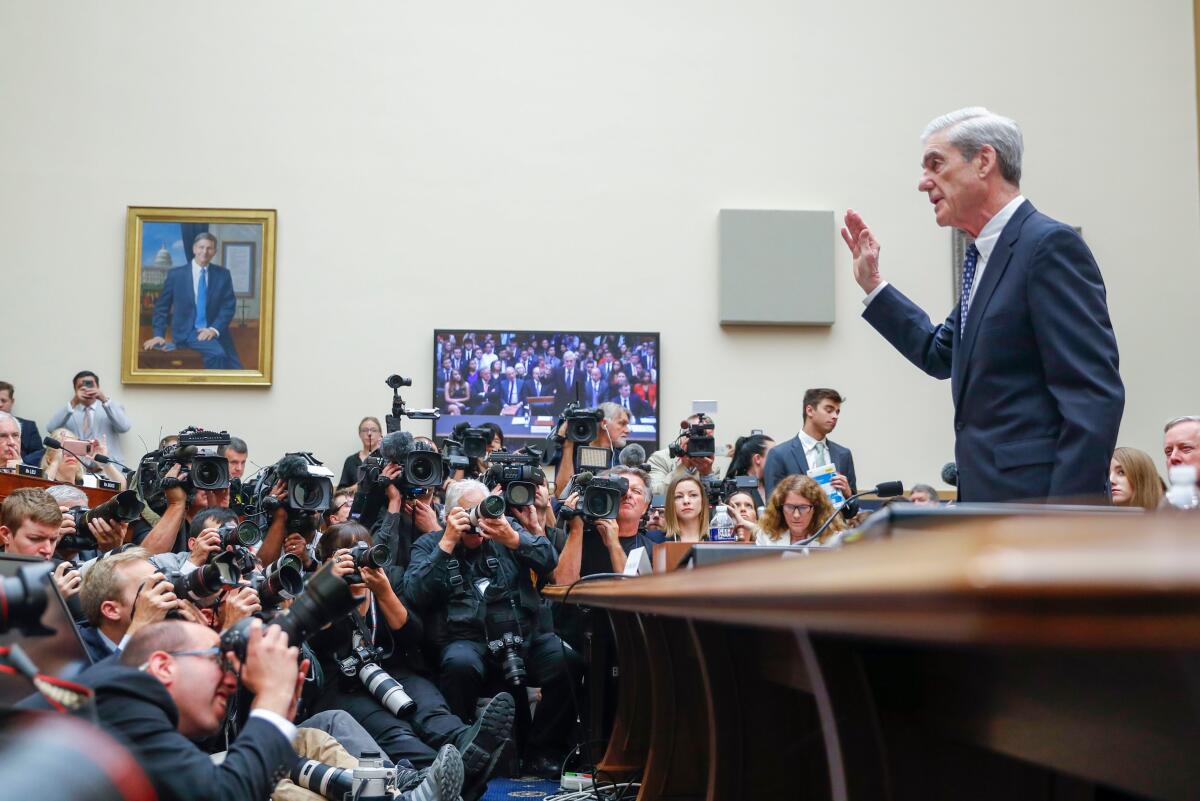Here’s how Democrats can make us care about Mueller’s tedious testimony

- Share via
To the editor: Was the movie better than the book? That depends on which version of Wednesday’s testimony by former Justice Department special counsel Robert S. Mueller III before the House Judiciary and Intelligence committees the public watched. (“Mueller’s testimony seems unlikely to boost impeachment — but could vindicate Pelosi,” July 24)
The expectations set for Mueller were unreasonably high; he has never been a dynamic speaker, and at the age of 74, he is far from a physically animated performer. Moreover, it would be hard for any circumspect person to remember the details of a 400-page nuanced report prepared by a large staff, let alone bring it to life.
Nevertheless, as someone who has spent his career studying political communication, I believe the rhetorical difference between viewing the entire Mueller hearing versus watching the short highlights assembled later in the day was profound. The former was tedious — certainly not compelling. The latter was surprisingly revealing and extremely potent. What now is clear is that, if they wish the public to pay attention to Mueller’s report, the Democrats should put together a short compilation of his most pointed and forceful statements on Wednesday.
It has become increasingly clear that most Americans do not get their news from the print media, and in the Trump era the facts do not speak for themselves. What transpired Wednesday reminds us about the rhetorical challenge: How most persuasively can a message be framed visually?
Richard Cherwitz, Austin, Texas
The writer is a professor of rhetoric at the University of Texas.
..
To the editor: Both sides are claiming victory after the Mueller testimony.
One big takeaway came after Rep. Doug Collins (R-Ga.) asked Mueller if his investigation was impeded, curtailed or stopped, and the answer was no. Even if the president had fired Mueller, it would not have stopped the investigation or resulted in the evidence being destroyed. The inquiry would have moved on with someone else talking over the head position.
No prosecutor in the country sets out to exonerate someone being charged with a crime. They try to prove guilt beyond a reasonable doubt, which Mueller’s team did not.
John Bush, Culver City
..
To the editor: As a genuine oddball member of the American electorate — one who wants the straight facts that are not distilled by the media — I read the Mueller report immediately upon its release and I taped and watched the hearings without commercials or commentary.
The facts are crystal clear: Under the law, Trump obstructed justice, but because of a Department of Justice policy he cannot be held accountable in a court of law while he is president.
What a sad state of affairs for our democracy. We are in desperate need of a fix.
Barbara Jackson, Cerritos
..
To the editor: Mueller’s two hearings lacked any dramatic “he’s guilty” moments; they were filled with affirmations that the president did indeed obstruct justice. The media coverage proves that without a bombshell revelation, a president who commits crimes will be allowed to go unpunished because there was no spectacle.
The union will not survive if a president is not held to account because the media believe there were not enough fireworks.
Can you imagine for one moment if this was President Obama and Republicans were the House majority? Impeachment articles would have been drafted last night.
Mike Aguilar, Costa Mesa
More to Read
A cure for the common opinion
Get thought-provoking perspectives with our weekly newsletter.
You may occasionally receive promotional content from the Los Angeles Times.









